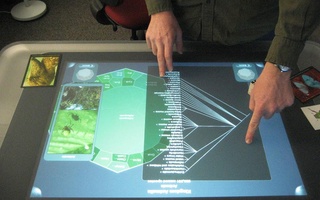{shortcode-951cacee2ad836bc5f6cced894bd3323e5fa16fc}
As part of a three-day think tank on education, a panel of professors and specialists convened in Longfellow Hall Thursday afternoon for a public forum titled “Educational Challenges of the 21st Century.”
Moderated by Graduate School of Education professor Fernando M. Reimers, the panel began with five speakers introducing topics that concerned them. Discussion ranged from the inequality of education standards across schools to youth unemployment rates and their relation to the education system.
“We have a youth unemployment rate that’s hovering 18, 20 percent,” said Nancy Hoffman, adjunct lecturer on education. “Countries like Switzerland and the Netherlands have rates in the single digits.”
The rest of the forum turned to a round of questions from audience members, who asked about a variety of topics—what it means for students to be college-ready, leadership roles in the educational system, and effective methods of evaluating teachers, a topic that prompted debate among the panelists.
Tufts University professor Amar Bhidé discussed the difficulty of evaluating a teacher’s impact on a student’s future. While a professor could make his students skilled for the time being, the current educational norms can become outdated. Just like certain technologies, though useful in the present, pedagogy can become obsolete, Bhidé said.
“Teaching is like putting a message in a bottle and putting it in the ocean,” he said. “You don’t know where it’ll end up.”
The comment prompted the other panelists to add their opinions.
“People try to oversimplify the teacher evaluation system,” Assistant Secretary for Elementary and Secondary Education at the U.S. Department of Education Deborah S. Delisle said. “How do we measure the care that a teacher gives when that kid’s parent passes away due to cancer?”
Throughout the event, the panelists offered insight into controversial topics surrounding modern education and the education system’s future.
Audience members represented diverse backgrounds, including visiting professors from other countries, graduate students, and college students.
“[These] kind of events help to identify the change we have to start now to create the educational system you would need in the following decades,” said visiting professor Sergio Cárdenas, who will also be participating in a panel discussion on Friday.
Education School student Danxi Shen praised the “diversity of experiences” she said the panelists brought to the table.
“We have a really different landscape and education reform must follow the trend,” Shen said. “If you want to educate the next generation of leaders, then we need to innovate the way we teach and learn.”
Read more in University News
HBS Breaks Ground on Ruth Mulan Chu Chao CenterRecommended Articles
-
Allston Residents Refocus AgendaKairos Shen, the popular chief planner for the Boston Redevelopment Authority, came to Allston last night intending to discuss long-term
-
Christian Groups Organize Around RaceFor many minority Christian students, religious organizations that provide a core of shared cultural values imbue their members with a level of comfort that allows them to explore their faiths.
-
 SEAS Group Wins National Science Foundation Grant
SEAS Group Wins National Science Foundation Grant -
A University, Not A Think TankTo be sure, there are ways that Harvard can continue and expand its commitment to greater social equality without trips to Washington. As an institution, Harvard should promote greater social responsibility by encouraging an ethic of public service among its students and provide those students with more opportunities and information about careers in that field.
-
Harvard Presents Allston UpdatesAs Harvard moves forward in its planning for Allston, the University updated community members on its progress at a Harvard-Allston Task Force meeting on Monday. But the announcement elicited much skepticism from residents, who said they felt the update lacked crucial details and a sufficient commitment from the University.
-
Harvard Begins Planning for AllstonHarvard initiated an open planning process that will create a new Institutional Master Plan for the University’s development in Allston at the Harvard-Allston Task Force meeting on Tuesday.













